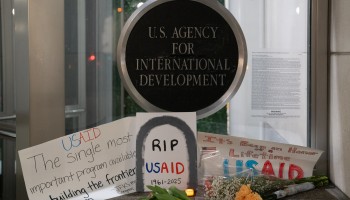U.S. President Donald Trump’s executive order pausing the prosecution of Americans accused of bribing foreign governments “diminishes the crown jewel in the U.S.’s fight against global corruption,” Transparency International warned, emphasizing that corruption and bribery should not become the norm.
Trump’s order rolled back the Foreign Corrupt Practices Act (FCPA), which made it illegal for U.S. companies and U.S.-listed foreign firms to bribe foreign officials. The White House claims the law has been detrimental to American economic competitiveness and, therefore, national security.
But Gary Kalman, Executive Director of Transparency International U.S., warned that “bribery raises the cost of doing business, destroys the credibility of corrupt participants, and results in real harm to local populations.”
“With the 1977 passage of the Foreign Corrupt Practices Act (FCPA), the United States became the world leader in addressing transnational corruption,” he explained, urging the rest of the world not to default “to where bribery and corruption are the norm.”
Under Trump’s executive order, newly sworn-in Attorney General Pam Bondi, a longtime staunch Trump ally, will suspend all implementation of the law, halt the initiation of any new investigations, and review all cases currently under investigation within a 180-day period.
The Attorney General will then issue updated guidance on the law or may extend the review period for an additional 180 days if necessary.
The U.S. president justified the rollback by saying the law “made it very, very hard from a practical standpoint to make deals.” Trump described the FCPA as “a horror show” that “hurts the country, and many, many deals are unable to be made because nobody wants to do business.”
In 2024 alone, at least 31 companies were investigated under the law, according to a White House fact sheet. Meanwhile, the ten-year average of FCPA-related enforcement reached 36 cases per year, allegedly “draining resources from both American businesses and law enforcement,” the statement said.
A few days before Trump’s order, Bondi issued a memo instructing U.S. Justice Department employees to “shift focus away” from investigations and cases brought under the FCPA that do not involve “criminal operations of cartels and transnational criminal organizations.”
In response to the Attorney General’s memo, Kalman warned that the “narrowed focus of enforcement” of the FCPA and the Foreign Extortion Prevention Act (FEPA) could result in “corrupt markets around the world [flourishing].”
The FCPA was passed in 1977 in the wake of the Watergate scandal, barring Americans and companies listed on U.S. stock exchanges from paying bribes to foreign officials. The law was later amended in 1998 to apply to foreign companies involved in any bribery within the U.S.
This move is expected to provide a reprieve for the Indian conglomerate Adani Group, whose billionaire CEO Gautam Adani, his nephew Sagar Adani, and six other executives were investigated under the law after a New York court charged them with bribery, securities fraud, wire fraud, and other conspiracies related to solar energy contracts.
In unrelated news, New York Mayor Eric Adams received a dismissal on Monday of the bribery charges against him, with the U.S. Department of Justice instructing prosecutors to drop the charges “as soon as is practicable.” Adams had been indicted last September on a five-count indictment, which included bribery and campaign finance fraud.






